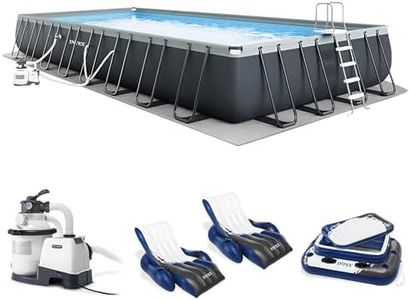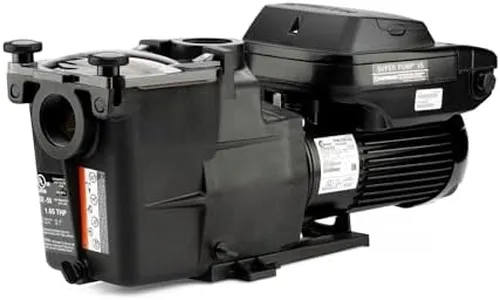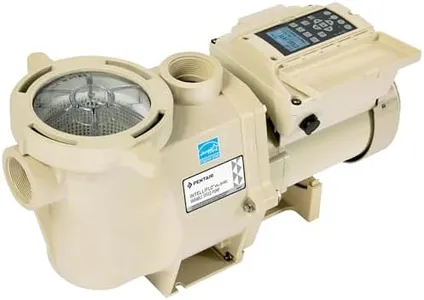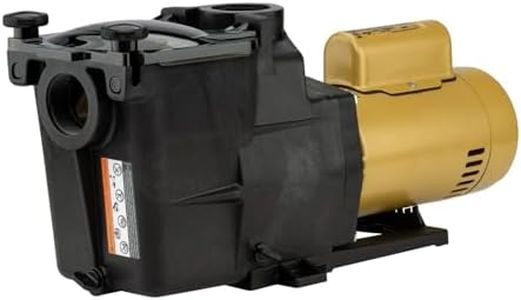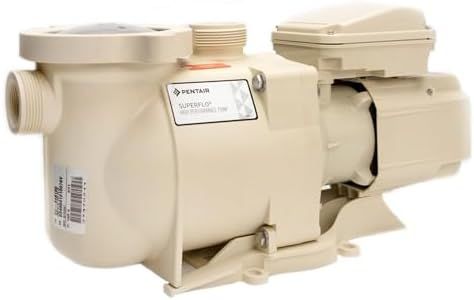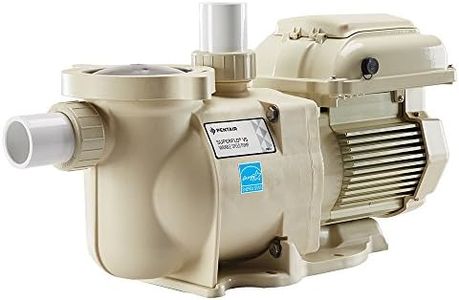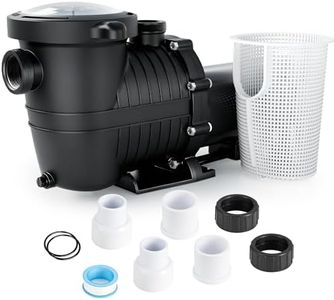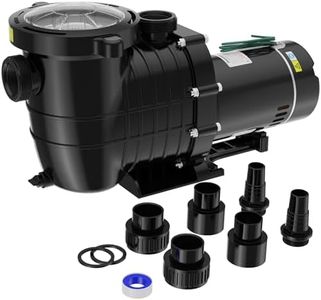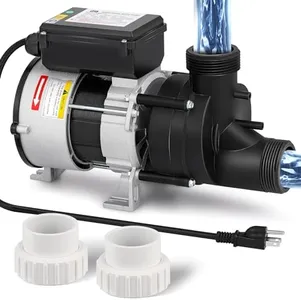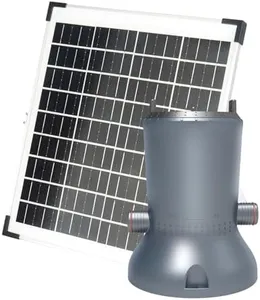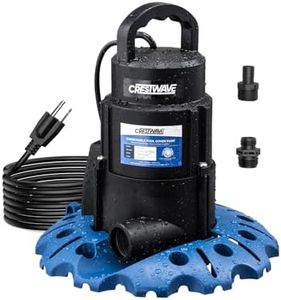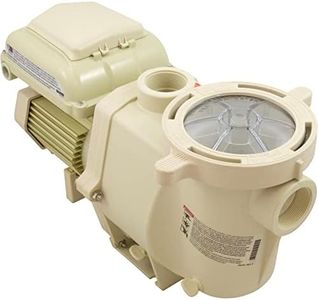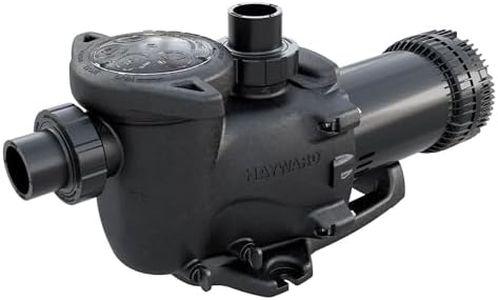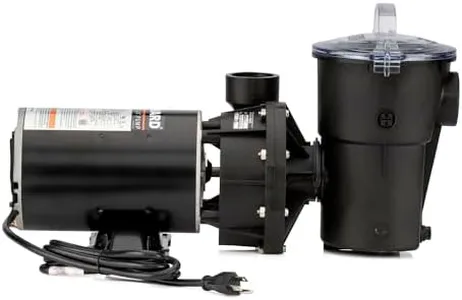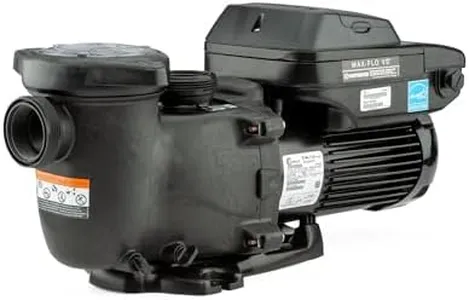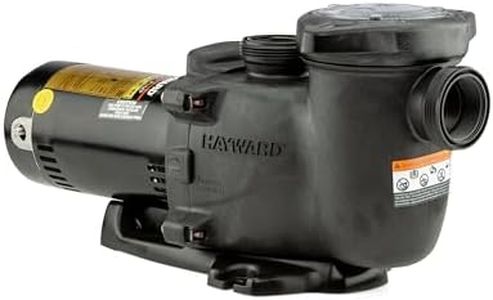10 Best Pool Pumps 2026 in the United States
Our technology thoroughly searches through the online shopping world, reviewing hundreds of sites. We then process and analyze this information, updating in real-time to bring you the latest top-rated products. This way, you always get the best and most current options available.

Our Top Picks
Winner
Hayward W3SP2603VSP Super Pump VS Variable-Speed Pool Pump for In-Ground Pools, Energy Efficient, 1.65 HP
Most important from
1431 reviews
The Hayward W3SP2603VSP Super Pump VS is a variable-speed pool pump with 1.65 horsepower, designed for in-ground pools. Its main strength is energy efficiency — it can save up to 80% on electricity compared to older single-speed pumps, which may also qualify you for local utility rebates. The motor uses advanced technology to run quietly, especially at lower speeds, making it less disruptive around your pool area. This pump is fairly easy to upgrade or connect to pool automation systems, and it features a flexible, programmable touchpad that can be mounted in different positions for convenience.
With a maximum flow rate of 75 gallons per minute, it offers solid water circulation suitable for most residential pools. The pump’s plastic build helps keep it lightweight but may not feel as robust as metal options, though it comes with a 3-year warranty for peace of mind. On the downside, it weighs 30 pounds and requires a 230-volt power source, which might need professional installation if your setup differs. Some users highlight its quiet operation and energy savings, but note that the initial cost and complexity can be higher than simpler pumps.
This Hayward pump is a good choice for pool owners who want to reduce energy costs, value quieter operation, and seek a versatile, durable option that supports modern pool automation.
Most important from
1431 reviews
Pentair EC-011057 - IntelliFlo VS+SVRS Variable Speed Pool Pump 3HP
Most important from
79 reviews
The Pentair EC-011057 IntelliFlo VS+SVRS is a variable speed pool pump with a powerful 3HP motor, making it well-suited for larger pools. Its variable speed capability allows for customizable flow rates, which can improve energy efficiency and reduce operational costs over time. The onboard control system and programmable speeds make it user-friendly, allowing for easy adjustments based on specific pool needs.
The Safety Vacuum Release System (SVRS) is a significant safety feature, ensuring the pump complies with VGB standards and providing an added layer of protection against entrapment accidents. The Cam and Ramp lid design simplifies inspection and cleaning, which is a plus for maintenance. However, at 52 pounds, it is relatively heavy, which might make installation a bit challenging.
Although the pump is designed for in-ground pools and offers durable construction, potential buyers should consider the initial investment cost and ensure that the energy savings align with their expectations. This pump is ideal for pool owners looking for a high-performance, energy-efficient, and customizable solution, particularly those prioritizing safety and ease of maintenance.
Most important from
79 reviews
Hayward W3SP2607X10 Super Pump Pool Pump, 1 HP
Most important from
1431 reviews
The Hayward W3SP2607X10 Super Pump Pool Pump is a reliable choice for pool owners. With a 1 HP motor, this pump delivers a maximum flow rate of 74 gallons per minute, suitable for medium-sized pools. Its heavy-duty motor ensures efficient and quieter operation, bolstered by effective airflow ventilation to keep it cool. The pump's extra-large debris basket reduces the frequency of maintenance, making it a convenient option for busy users.
The swing-away hand knobs allow for easy strainer cover removal without needing tools, and the unique 4-bolt design offers straightforward access to internal components, simplifying servicing tasks. Despite being corded electric, which might limit placement options, the pump's robust build and ease of maintenance make it a durable and dependable choice. However, being a single-speed pump, it may not be as energy-efficient as variable-speed models.
Its noise level is relatively low due to design considerations, but it may still be noticeable during operation. The plastic material, while sturdy, might not offer the longevity of metal counterparts. Given its specifications, the Hayward Super Pump is ideal for pool owners prioritizing reliability and ease of use over advanced energy efficiency features.
Most important from
1431 reviews
Buying Guide for the Best Pool Pumps
Choosing the right pool pump is essential for maintaining clean and clear water in your swimming pool. A pool pump circulates water through the filtration system, removing debris and contaminants. When selecting a pool pump, it's important to consider several key specifications to ensure you get the best fit for your pool's size, type, and usage. Understanding these specifications will help you make an informed decision and keep your pool in optimal condition.FAQ
Most Popular Categories Right Now
